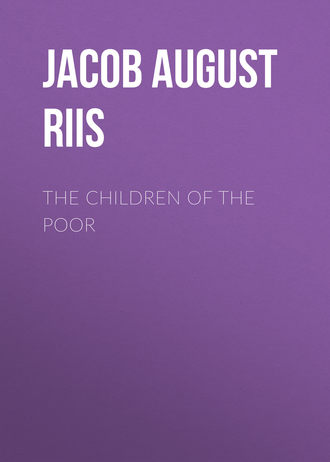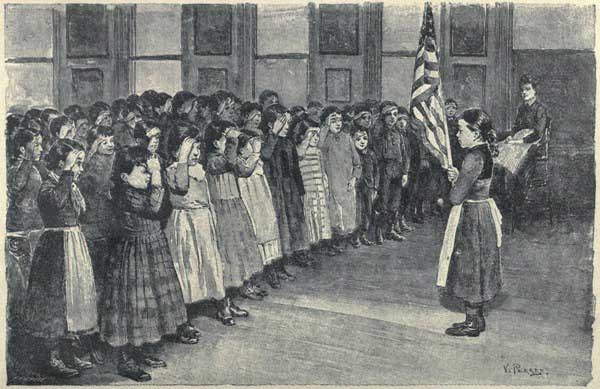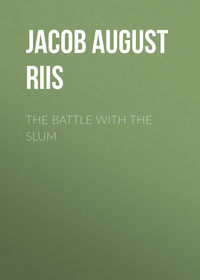 полная версия
полная версияThe Children of the Poor

Jacob A. Riis
The Children of the Poor

PREFACE
To my little ones, who, as I lay down my pen, come rushing in from the autumn fields, their hands filled with flowers “for the poor children,” I inscribe this book. May the love that shines in their eager eyes never grow cold within them; then they shall yet grow up to give a helping hand in working out this problem which so plagues the world to-day. As to their father’s share, it has been a very small and simple one, and now it is done. Other hands may carry forward the work. My aim has been to gather the facts for them to build upon. I said it in “How the Other Half Lives,” and now, in sending this volume to the printer, I can add nothing. The two books are one. Each supplements the other. Ours is an age of facts. It wants facts, not theories, and facts I have endeavored to set down in these pages. The reader may differ with me as to the application of them. He may be right and I wrong. But we shall not quarrel as to the facts themselves, I think. A false prophet in our day could do less harm than a careless reporter. That name I hope I shall not deserve.
To lay aside a work that has been so long a part of one’s life, is like losing a friend. But for the one lost I have gained many. They have been much to me. The friendship and counsel of Dr. Roger S. Tracy, of the Bureau of Vital Statistics, have lightened my labors as nothing else could save the presence and the sympathy of the best and dearest friend of all, my wife. To Major Willard Bullard, the most efficient chief of the Sanitary Police; Rabbi Adolph M. Radin; Mr. A. S. Solomons, of the Baron de Hirsch Relief Committee; Dr. Annie Sturges Daniel; Mr. L. W. Holste, of the Children’s Aid Society; Colonel George T. Balch, of the Board of Education; Mr. A. S. Fairchild, and to Dr. Max L. Margolis, my thanks are due and here given. Jew and Gentile, we have sought the truth together. Our reward must be in the consciousness that we have sought it faithfully and according to our light.
J. A. R.Richmond Hill, Long Island,
October 1, 1892.
CHAPTER I.
THE PROBLEM OF THE CHILDREN
THE problem of the children is the problem of the State. As we mould the children of the toiling masses in our cities, so we shape the destiny of the State which they will rule in their turn, taking the reins from our hands. In proportion as we neglect or pass them by, the blame for bad government to come rests upon us. The cities long since held the balance of power; their dominion will be absolute soon unless the near future finds some way of scattering the population which the era of steam-power and industrial development has crowded together in the great centres of that energy. At the beginning of the century the urban population of the United States was 3.97 per cent. of the whole, or not quite one in twenty-five. To-day it is 29.12 per cent., or nearly one in three. In the lifetime of those who were babies in arms when the first gun was fired upon Fort Sumter it has all but doubled. A million and a quarter live to-day in the tenements of the American metropolis. Clearly, there is reason for the sharp attention given at last to the life and the doings of the other half, too long unconsidered. Philanthropy we call it sometimes with patronizing airs. Better call it self-defence.
In New York there is all the more reason because it is the open door through which pours in a practically unrestricted immigration, unfamiliar with and unattuned to our institutions; the dumping-ground where it rids itself of its burden of helplessness and incapacity, leaving the procession of the strong and the able free to move on. This sediment forms the body of our poor, the contingent that lives, always from hand to mouth, with no provision and no means of providing for the morrow. In the first generation it pre-empts our slums;1 in the second, its worst elements, reinforced by the influences that prevail there, develop the tough, who confronts society with the claim that the world owes him a living and that he will collect it in his own way. His plan is a practical application of the spirit of our free institutions as his opportunities have enabled him to grasp it.
Thus it comes about that here in New York to seek the children of the poor one must go among those who, if they did not themselves come over the sea, can rarely count back another generation born on American soil. Not that there is far to go. Any tenement district will furnish its own tribe, or medley of many tribes. Nor is it by any means certain that the children when found will own their alien descent. Indeed, as a preliminary to gaining their confidence, to hint at such a thing would be a bad blunder. The ragged Avenue B boy, whose father at his age had barely heard, in his corner of the Fatherland, of America as a place where the streets were paved with nuggets of gold and roast pigeons flew into mouths opening wide with wonder, would, it is safe to bet, be as prompt to resent the insinuation that he was a “Dutchman,” as would the little “Mick” the Teuton’s sore taunt. Even the son of the immigrant Jew in his virtual isolation strains impatiently at the fetters of race and faith, while the Italian takes abuse philosophically only when in the minority and bides his time until he too shall be able to prove his title by calling those who came after him names. However, to quarrel with the one or the other on that ground would be useless. It is the logic of the lad’s evolution, the way of patriotism in the slums. His sincerity need not be questioned.
Many other things about him may be, and justly are, but not that. It is perfectly transparent. His badness is as spontaneous as his goodness, and for the moment all there is of the child. Whichever streak happens to prevail, it is in full possession; if the bad is on top more frequently than the other, it is his misfortune rather than his design. He is as ready to give his only cent to a hungrier boy than he if it is settled that he can “lick” him, and that he is therefore not a rival, as he is to join him in torturing an unoffending cat for the common cheer. The penny and the cat, the charity and the cruelty, are both pregnant facts in the life that surrounds him, and of which he is to be the coming exponent. In after years, when he is arrested by the officers of the Society for the Prevention of Cruelty to Animals for beating his horse, the episode adds but to his confusion of mind in which a single impression stands out clear and lasting, viz., that somehow he got the worst of it as usual. But for the punishment, the whole proceeding must seem ludicrous to him. As it is he submits without comprehending. He had to take the hard knocks always; why should not his horse?
In other words, the child is a creature of environment, of opportunity, as children are everywhere. And the environment here has been bad, as it was and is in the lands across the sea that sent him to us. Our slums have fairly rivalled, and in some respects outdone, the older ones after which they patterned. Still, there is a difference, the difference between the old slum and the new. The hopelessness, the sullen submission of life in East London as we have seen it portrayed, has no counterpart here; neither has the child born in the gutter and predestined by the order of society, from which there is no appeal, to die there. We have our Lost Tenth to fill the trench in the Potter’s Field; quite as many wrecks at the finish, perhaps, but the start seems fairer in the promise. Even on the slums the doctrine of liberty has set its stamp. To be sure, for the want of the schooling to decipher it properly, they spell it license there, and the slip makes trouble. The tough and his scheme of levying tribute are the result. But the police settle that with him, and when it comes to a choice, the tough is to be preferred to the born pauper any day. The one has the making of something in him, unpromising as he looks; seen in a certain light he may even be considered a hopeful symptom. The other is just so much dead loss. The tough is not born: he is made. The all-important point is the one at which the manufacture can be stopped.
So rapid and great are the changes in American cities, that no slum has yet had a chance here to grow old enough to distil its deadliest poison. New York has been no exception. But we cannot always go at so fast a pace. There is evidence enough in the crystallization of the varying elements of the population along certain lines, no longer as uncertain as they were, that we are slowing up already. Any observer of the poor in this city is familiar with the appearance among them of that most distressing and most dangerous symptom, the home-feeling for the slum that opposes all efforts at betterment with dull indifference. Pauperism seems to have grown faster of late than even the efforts put forth to check it. We have witnessed this past winter a dozen times the spectacle of beggars extorting money by threats or violence without the excuse which a season of exceptional distress or hardship might have furnished. Further, the raid in the last Legislature upon the structure of law built up in a generation to regulate and keep the tenements within safe limits, shows that fresh danger threatens in the alliance of the slum with politics. Only the strongest public sentiment, kept always up to the point of prompt action, avails to ward off this peril. But public sentiment soon wearies of such watch-duty, as instanced on this occasion, when several bills radically remodelling the tenement-house law and repealing some of its most beneficent provisions, had passed both houses and were in the hands of the Governor before a voice was raised against them, or anyone beside the politicians and their backers seemed even to have heard of them. And this hardly five years after a special commission of distinguished citizens had sat an entire winter under authority of the State considering the tenement-house problem, and as the result of its labors had secured as vital the enactment of the very law against which the raid seemed to be chiefly directed!
The tenement and the saloon, with the street that does not always divide them, form the environment that is to make or unmake the child. The influence of each of the three is bad. Together they have power to overcome the strongest resistance. But the child born under their evil spell has none such to offer. The testimony of all to whom has fallen the task of undoing as much of the harm done by them as may be, from the priest of the parish school to the chaplain of the penitentiary, agrees upon this point, that even the tough, with all his desperation, is weak rather than vicious. He promises well, he even means well; he is as downright sincere in his repentance as he was in his wrong-doing; but it doesn’t prevent him from doing the very same evil deed over again the minute he is rid of restraint. He would rather be a saint than a sinner; but somehow he doesn’t keep in the rôle of saint, while the police help perpetuate the memory of his wickedness. After all, he is not so very different from the rest of us. Perhaps that, with a remorseful review of the chances he has had, may help to make a fellow-feeling for him in us.
That is what he needs. The facts clearly indicate that from the environment little improvement in the child is to be expected. There has been progress in the way of building the tenements of late years, but they swarm with greater crowds than ever—good reason why they challenge the pernicious activity of the politician; and the old rookeries disappear slowly. In the relation of the saloon to the child there has been no visible improvement, and the street is still his refuge. It is, then, his opportunities outside that must be improved if relief is to come. We have the choice of hailing him man and brother or of being slugged and robbed by him. It ought not to be a hard choice, despite the tatters and the dirt, for which our past neglect is in great part to blame. Plenty of evidence will be found in these pages to show that it has been made in the right spirit already, and that it has proved a wise choice. No investment gives a better return to-day on the capital put out than work among the children of the poor.
A single fact will show what is meant by that. Within the lifetime of the Children’s Aid Society, in the thirty years between 1860 and 1890, while the population of this city was doubled, the commitments of girls and women for vagrancy fell off from 5,880 to 1,980, while the commitments of girl thieves fell between 1865 and 1890 from 1 in 743 to 1 in 7,500.2 Stealing and vagrancy among boys has decreased too; if not so fast, yet at a gratifying rate.
Enough has been written and said about the children of the poor and their sufferings to make many a bigger book than this. From some of it one might almost be led to believe that one-half of the children are worked like slaves from toddling infancy, while the other half wander homeless and helpless about the streets. Their miseries are great enough without inventing any that do not exist. There is no such host of child outcasts in New York as that. Thanks to the unwearied efforts of the children’s societies in the last generation, what there is is decreasing, if anything. As for the little toilers, they will receive attention further on. There are enough of them, but as a whole they are anything but a repining lot. They suffer less, to their own knowledge, from their wretched life than the community suffers for letting them live it, though it, too, sees the truth but in glimpses. If the question were put to a vote of the children to-morrow, whether they would take the old life with its drawbacks, its occasional starvation, and its everyday kicks and hard knocks; or the good clothes, the plentiful grub, and warm bed, with all the restraints of civilized society and the “Sunday-school racket” of the other boy thrown in, I have as little doubt that the street would carry the day by a practically unanimous vote as I have that there are people still to be found—too many of them—who would indorse the choice with a sigh of relief and dismiss the subject, if it could be dismissed that way; which, happily, it cannot.
The immediate duty which the community has to perform for its own protection is to school the children first of all into good Americans, and next into useful citizens. As a community it has not attended to this duty as it should; but private effort has stepped in and is making up for its neglect with encouraging success. The outlook that was gloomy from the point of view of the tenement, brightens when seen from this angle, however toilsome the road yet ahead. The inpouring of alien races no longer darkens it. The problems that seemed so perplexing in the light of freshly-formed prejudices against this or that immigrant, yield to this simple solution that discovers all alarm to have been groundless. Yesterday it was the swarthy Italian, to-day the Russian Jew, that excited our distrust. To-morrow it may be the Arab or the Greek. All alike they have taken, or are taking, their places in the ranks of our social phalanx, pushing upward from the bottom with steady effort, as I believe they will continue to do unless failure to provide them with proper homes arrests the process. And in the general advance the children, thus firmly grasped, are seen to be a powerful moving force. The one immigrant who does not keep step, who, having fallen out of the ranks, has been ordered to the rear, is the Chinaman, who brought neither wife nor children to push him ahead. He left them behind that he might not become an American, and by the standard he himself set up he has been judged.
CHAPTER II.
THE ITALIAN SLUM CHILDREN
WHO and where are the slum children of New York to-day? That depends on what is understood by the term. The moralist might seek them in Hell’s Kitchen, in Battle Row, and in the tenements, east and west, where the descendants of the poorest Irish immigrants live. They are the ones, as I have before tried to show, upon whom the tenement and the saloon set their stamp soonest and deepest. The observer of physical facts merely would doubtless pick out the Italian ragamuffins first, and from his standpoint he would be right. Irish poverty is not picturesque in the New World, whatever it may have been in the Old. Italian poverty is. The worst old rookeries fall everywhere in this city to the share of the immigrants from Southern Italy, who are content to occupy them, partly, perhaps, because they are no worse than the hovels they left behind, but mainly because they are tricked or bullied into putting up with them by their smarter countrymen who turn their helplessness and ignorance to good account. Wherever the invasion of some old home section by the tide of business has left ramshackle tenements falling into hopeless decay, as in the old “Africa,” in the Bend, and in many other places in the down-town wards, the Italian sweater landlord is ready with his offer of a lease to bridge over the interregnum, a lease that takes no account of repairs or of the improvements the owner sought to avoid. The crowds to make it profitable to him are never wanting. The bait he holds out is a job at the ash-dump with which he connects at the other end of the line. The house, the job, and the man as he comes to them fit in well together, and the copartnership has given the Italian a character which, I am satisfied from close observation of him, he does not wholly deserve. At all events, his wife does not. Dirty as he seems and is in the old rags that harmonize so well with his surroundings, there is that about her which suggests not only the capacity for better things, but a willingness to be clean and to look decent, if cause can be shown. It may be a bright kerchief, a bit of old-fashioned jewelry, or the neatly smoothed and braided hair of the wrinkled old hag who presides over the stale bread counter. Even in the worst dens occupied by these people, provided that they had not occupied them too long, I have found this trait crop out in the careful scrubbing of some piece of oil-cloth rescued from the dump and laid as a mat in front of the family bed; or in a bit of fringe on the sheet or quilt, ragged and black with age though it was, that showed what a fruitful soil proper training and decent housing would have found there.
I have in mind one Italian “flat” among many, a half underground hole in a South Fifth Avenue yard, reached by odd passage-ways through a tumbledown tenement that was always full of bad smells and scooting rats. Across the foul and slippery yard, down three steps made of charred timbers from some worse wreck, was this “flat,” where five children slept with their elders. How many of those there were I never knew. There were three big family beds, and they nearly filled the room, leaving only patches of the mud floor visible. The walls were absolutely black with age and smoke. The plaster had fallen off in patches and there was green mould on the ceiling. And yet, with it all, with the swarm of squirming youngsters that were as black as the floor they rolled upon, there was evidence of a desperate, if hopeless, groping after order, even neatness. The beds were made up as nicely as they could be with the old quilts and pieces of carpet that served for covering. In Poverty Gap, where an Italian would be stoned as likely as not, there would have been a heap of dirty straw instead of beds, and the artistic arrangement of tallow-dips stuck in the necks of bottles about the newspaper cut of a saint on the corner shelf would have been missing altogether, fervent though the personal regard might be of Poverty Gap for the saint. The bottles would have been the only part of the exhibition sure to be seen there.
I am satisfied that this instinct inhabits not only the more aristocratic Genoese, but his fellow countryman from the southern hills as well, little as they resemble each other or agree in most things. But the Neapolitan especially does not often get a chance to prove it. He is so altogether uninviting an object when he presents himself, fresh from the steamer, that he falls naturally the victim of the slum tenement, which in his keep becomes, despite the vigilance of the sanitary police, easily enough the convenient depot and half-way house between the garbage-dump and the bone-factory. Starting thus below the bottom, as it were, he has an up-hill journey before him if he is to work out of the slums, and the promise, to put it mildly, is not good. He does it all the same, or, if not he, his boy. It is not an Italian sediment that breeds the tough. Parental authority has a strong enough grip on the lad in Mulberry Street to make him work, and that is his salvation. “In seventeen years,” said the teacher of the oldest Italian ragged school in the city that, day and night, takes in quite six hundred, “I have seen my boys work up into decent mechanics and useful citizens almost to a man, and of my girls only two I know of have gone astray.” I had observed the process often enough myself to know that she was right. It is to be remembered, furthermore, that her school is in the very heart of the Five Points district, and takes in always the worst and the dirtiest crowds of children.
Within a year there has been, through some caprice of immigration, a distinct descent in the quality of the children, viewed from even the standard of cleanliness that prevails at the Five Points. Perhaps the exodus from Italy has worked farther south, where there seems to be an unusual supply of mud. Perhaps the rivalry of steamship lines has brought it about. At any rate, the testimony is positive that the children that came to the schools after last vacation, and have kept coming since, were the worst seen here since the influx began. I have watched with satisfaction, since this became apparent, some of the bad old tenements, which the newcomers always sought in droves, disappear to make room for great factory buildings. But there are enough left. The cleaning out of a Mulberry Street block left one lop-sided old rear tenement that had long since been shut in on three sides by buildings four stories higher than itself, and forgotten by all the world save the miserable wretches who burrowed in that dark and dismal pit at the bottom of a narrow alley. Now, when the fourth structure goes up against its very windows, it will stand there in the heart of the block, a survival of the unfittest, that, in all its disheartening dreariness, bears testimony, nevertheless, to the beneficent activity of the best Board of Health New York has ever had—the onward sweep of business. It will wipe that last remnant out also, even if the law lack the power to reach it.
Shoals of Italian children lived in that rookery, and in those the workmen tore down, in the actual physical atmosphere of the dump. Not a gun-shot away there is a block of tenements, known as the Mott Street Barracks, in which still greater shoals are—I was going to say housed, but that would have been a mistake. Happily they are that very rarely, except when they are asleep, and not then if they can help it. Out on the street they may be found tumbling in the dirt, or up on the roof lying stark-naked, blinking in the sun—content with life as they find it. If they are not a very cleanly crew, they are at least as clean as the frame they are set in, though it must be allowed that something has been done of late years to redeem the buildings from the reproach of a bad past. The combination of a Jew for a landlord and a saloon-keeper—Italian, of course—for a lessee, was not propitious; but the buildings happen to be directly under the windows of the Health Board, and something, I suppose, was due to appearances. The authorities did all that could be done, short of tearing down the tenement, but though comparatively clean, and not nearly as crowded as it was, it is still the old slum. It is an instructive instance of what can and cannot be done with the tenements into which we invite these dirty strangers to teach them American ways and the self-respect of future citizens and voters. There are five buildings—that is, five front and four rear houses, the latter a story higher than those on the street; that is because the rear houses were built last, to “accommodate” this very Italian immigration that could be made to pay for anything. Chiefly Irish had lived there before, but they moved out then. There were 360 tenants in the Barracks when the police census was taken in 1888, and 40 of them were babies. How many were romping children I do not know. The “yard” they had to play in is just 5 feet 10 inches wide, and a dozen steps below the street-level. The closets of all the buildings are in the cellar of the rear houses and open upon this “yard,” where it is always dark and damp as in a dungeon. Its foul stenches reach even the top floor, but so also does the sun at mid-day, and that is a luxury that counts as an extra in the contract with the landlord. The rent is nearly one-half higher near the top than it is on the street-level. Nine dollars above, six and a half below, for one room with windows, two without, and with barely space for a bed in each. But water-pipes have been put in lately, under orders from the Health Department, and the rents have doubtless been raised. “No windows” means no ventilation. The rear building backs up against the tenement on the next street; a space a foot wide separates them, but an attempt to ventilate the bed-rooms by windows on that was a failure.









